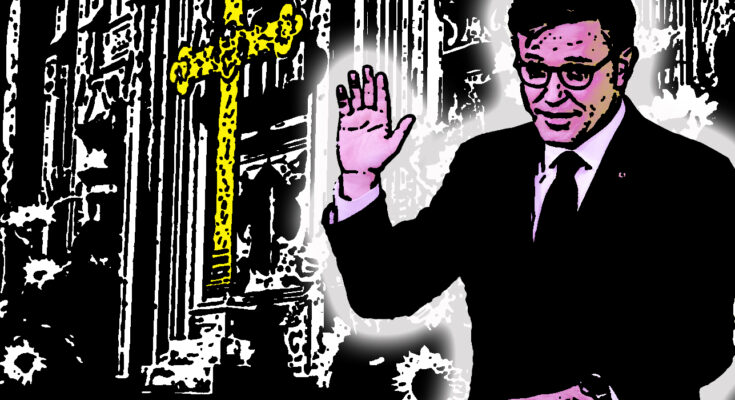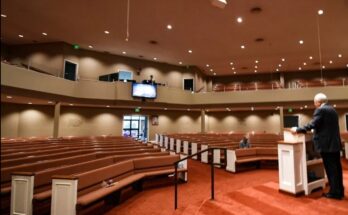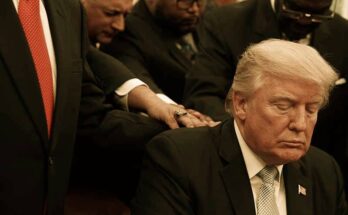Last week, Republicans nominated Mike Johnson (R-LA) as Speaker of the House. As many were quick to note, he is the most controversial and divisive Speaker in the modern era.
Shortly after his appointment, he appeared on Sean Hannity’s show where he explained that the best way to know what his political views are, would be to “go pick up a Bible off your shelf and read it. That’s my worldview.'”
Another path of discovery would be to simply read his published articles and listen to his interviews and podcasts. And there’s a mountain of scat to cull from.
He has declared homosexuality as “inherently unnatural” and “harmful”, did not oppose employment discrimination based on sexual orientation, has argued for making homosexual acts illegal, fully endorsed Trump’s unfounded election fraud claims in 2020 and on the morning of January 6th goaded the American people to “fight” to preserve the Republic. Johnson subscribes to the common White Nationalist Great Replacement Theory, which maintains that liberal immigration policies are a political strategy designed to “replace” the European, white population. He also belongs to a number of Far Right Evangelical organizations, including the Alliance Defending Freedom. And as an aside, he apparently maintains a “porn accountability” covenant with his own son.
All of this should trigger the crackpot alert for any rational American, regardless of their partisan persuasion.
However, the most alarming thing about Speaker Mike Johnson, isn’t his condemnation of gays or his alignment with Identarian ideas or even that he and his son monitor each others internet searches—it’s his over-arching Christian Nationalism, i.e. his belief that the Constitution is a Christian document and that the United States is, by virtue of its alleged biblical underpinnings, a “Christian nation”.
Johnson doesn’t see elected office as mere public service. His role as Speaker of the House is one he believes has been sovereignly ordained by God. He and other Republicans have been placed in office in order to help bring the population and its laws under the authority of Jesus Christ and the Word of God. He is convinced, like his pseudo-historian mentor David Barton, that Thomas Jefferson’s “wall of separation” between Church and State is a liberal, secular humanist myth.
He strongly believes that lawmakers should “restore biblical values in the public square”– which for anyone fuzzy about such language, is actually Evangelical shorthand for “make Levitical purity codes into laws”.
This, my friends, is the person second in line from the presidency of the United States.
Christian Nationalism 101
The original Christian Nationalists were pissed off, just like they are today.
The difference was, 150 years ago they were up in arms because the nation’s founding document wasn’t Christian enough!
The Christian Amendment Movement started among Protestant churches during the Civil War and sought to address what they felt was the macro issue in America— the fact that the US Constitution didn’t once mention God, the Bible or Jesus Christ.
When the Civil war started, many devout, Bible-believing Protestants felt that it was a judgment from God upon the nation– primarily because of what they saw as our “godless Constitution”. Our founding document, they claimed, was an “act of hubris” that placed faith in “We the People” rather than in Jesus Christ.
One of the nation’s leading Christian publications at the time, The Independent, published an article by D. McAllister entitled “Testimonies to the Religious Defect of the Constitution”. The article built a case, citing prominent Christians going all the way back to the birth of the nation, who were all foamed-up about Jesus Christ’s complete absence from the Constitution.
“But from the Constitution of the United States alone, it is impossible to ascertain what God we worship, or whether we own a God at all… From this atheistic error in our prime conceptions of government, has arisen the atheistic habit of separating politics from religion. ”
D. McAllister
He went on to explain that this Christian quarrel with the secular nature of the Constitution, went back to beginning. He quotes Dr. John M. Mason from 1800:
“The Federal Constitution makes no acknowledgment of that God who gave us our national existence, and saved us from anarchy and internal war. This neglect has excited in many of its best friends more alarm than all other difficulties.”
The President of Yale College, Timothy Dwight, said in 1812 regarding his apprehension about America as a nation:
“The second of these reasons is, the sinful character of our nation.
Not withstanding the prevalence of religion which I have described, the irreligion and the wickedness of our land are such as to furnish a most painful and melancholy prospect to a serious mind.We formed our Constitution without any acknowledgment of God, without any recognition of his mercies to us as a people, of his government, or even of his existence. The convention by which it was formed, never asked, even once, his direction or his blessing upon their labors. Thus we commenced our national existence, under the present system, without God”.
David Junkin, a leading Presbyterian pastor in Pennsylvania vented in 1845:
“The oath of the President of the United States [as embodied in the Constitution] could as well be taken by a Pagan or a Mohammedan, as by the Chief Magistrate of a Christian people; it excludes the name of the Supreme Being. Indeed, it is negatively atheistical, for no God is appealed to at all.”
To make matters even worse, freethinkers, Universalists, Jews, Catholics, metaphysical groups and various outsider Christian sects like the Mormons and Seventh Day Adventists, were beginning to put down roots in the fledgling Republic. And this was becoming a serious problem.
Sociologists refer to this phenomena as group threat theory. When the size of an outgroup– in this case freethinkers, Catholics and the unusual, new sects of the mid to late 19th century– grows to a significant degree, the ingroup will invariably feel “under attack”.
In February 1863, a coalition of 11 Protestant churches behind layman John Alexander, introduced an amendment to acknowledge “the rulership of Jesus Christ and the supremacy of the divine law” in the U.S. Constitution. Alexander became the head of the not-so-stealthily-named National Association to Secure the Religious Amendment of the Constitution. The group, perhaps seeing the clumsy, theocratic nature of their own name, decided that subtlety was a better strategy and renamed themselves the “National Reform Association”.
One proposed amendment to the Constitution (there were several), would seek to rephrase the preamble so that it read as follows:
We, the people of the United States, humbly acknowledging Almighty God as the source of all authority and power in civil government, the Lord Jesus Christ as the Ruler among the nations, His revealed will as the supreme law of the land, in order to constitute a Christian government, and in order to form a more perfect union, establish justice, insure domestic tranquility, provide for the common defense, promote the general welfare, and secure the inalienable rights and the blessings of life, liberty, and the pursuit of happiness to ourselves
andour posterity, and all the people, do ordain and establish this Constitution for the United States of America.
Lacking the support in Congress during the Civil War, the proposed amendment never even reached a vote in the House of Representatives. By 1873, the group continued to press onward with their mission, eventually amassing 35,000 signatures around the country.
Between 1874 and 1969, the loose movement would attempt to “Christianize” the Constitution in Congress, a total of 17 times. Although offshoots of the movement succeeded in officially inserting the phrase “one nation under God” into our Pledge of Allegiance in 1954, none of their battles to change the secular language of the Constitution succeeded.
“Flipping the Script”
During the Cold War, the tactics of those seeking to “Christianize” the Constitution, began to shift. In order to properly differentiate our nation from the “godless” Soviets, the movement began using more innocuous phrases like “returning to our Judeo-Christian heritage“. In more moderate circles, the term is still used. At some point during the era of Pope Falwell Sr., this approach was abandoned by the more fervent, in favor of something that could actually work.
Today’s dominant religious group– the Evangelical Right– have stopped blatantly trying to change the language of the Constitution like their Christian Amendment brethren. Over the past 25 years, they unveiled a brilliant, new sleight of hand trick:
They now claim that the Constitution was really a Christian document all along!

Christian Nationalist and junk “historian” David Barton, has been the bandleader of this theme. Barton spent the better part of a couple decades pushing the deceptive idea that the Constitution not only quotes liberally from the Bible, but that the Bible was “hands down the single most cited source of ideas” for the architects of the Constitution. Barton has been quoted and retweeted by many of today’s leading Republicans, including former vice-president Mike Pence.
Barton was at one time, a more fringe, Dominionist figure who aligned with crackpot Word Faith televangelists like Kenneth Copeland and others on the TBN freak show roster. Those days are gone. He has been fully mainstreamed and his completely ahistorical claims have become some of the primary talking points of Republican politics.
Christian Nationalists like Barton, no longer decry a secular Constitution. They insist that the founders were rabid fundamentalists like them and that the Constitution was actually drafted from biblical doctrines. It’s a jaw-dropping, alternate reality reversal, from where they used to be.
In the “alternative facts” bubble of today’s Republican Party, it has become a winning strategy for transforming our pluralistic liberal democracy, into a Christian theocracy.
And for the first time in two centuries, it appears to be working.
“The principle on which this country was founded and by which it has always governed is that Americanism is a matter of the mind and the heart; Americanism is not, and never was, a matter of race or ancestry. A good American is one who is loyal to this country and to our creed of liberty and democracy”.
Franklin Delano Roosevelt, 1943




